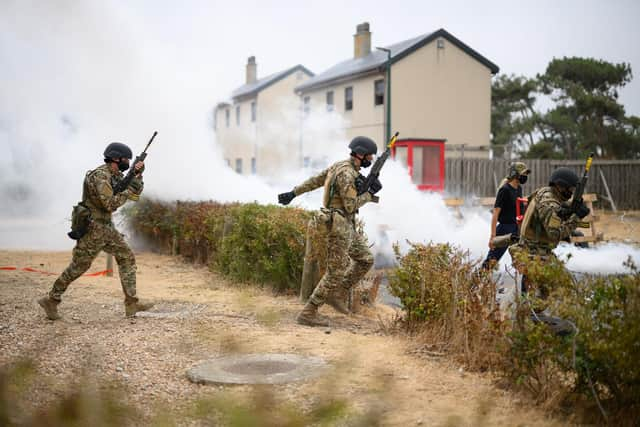Russian policy on Ukraine could get more aggressive as war escalates - Patrick Mercer
Suddenly, the threat of nuclear explosions, of toxic dust and radiation sickness has ceased to be a politician’s empty threat and turned into reality as the largest nuclear power station in Europe - Zaporizhzhia - is being shelled and rocketed every day.
The UN Security Council met inconclusively last Tuesday to discuss the crisis, showing just how hard the problem is to untangle. Zaporizhzhia sprawls over many acres right on the south bank of the strategically vital Dneiper river having been captured by Moscow’s forces in March although it’s still run by a Ukrainian workforce. Opposite, on the north bank, are Kiev’s guns which are openly bombarding their enemies within the power plant: the media tells us, though, that some or all of those explosions are caused by Russians shelling their own troops. It’s hard to make any sense of that.
Advertisement
Hide AdAdvertisement
Hide AdThe crux of the issue is energy. Zaporizhzhia still provides power not just to the occupied south and east, but also to central Ukraine across the Dneiper; now Russia’s working to disconnect the supply northwards and divert it entirely to the newly overrun territories in an effort not just to deprive their foes of heat and light, but also to demonstrate the benevolence of Moscow’s control.


The crisis is further clouded by claims that Russia has mined the plant against recapture or, possibly, in preparation for a ‘false flag’ strike when it might be deliberately detonated and Ukraine blamed. But, think about it, why would either side want to create a Chernobyl plus plus disaster which would kill tens of thousands of Ukrainians or newly-converted-to-Russian Ukrainians, allow radioactive dust to ruin the ground it covers for decades, poison the Black Sea and, depending on the direction of the wind, contaminate countless, other countries?
Well, brinkmanship with this giant time bomb perhaps suits both sides. Ukraine might hope to draw NATO into direct involvement whilst Russia could seek sympathy and support for herself as she paints her opponents as crazed, ‘nuclear terrorists’. And there are yet further layers to this problem.
On the back of the Zaporizhzhia crisis, a very senior commentator has suggested the possibility of Russia using small, tactical nukes on the battlefield and he’s even gone so far as to say that the West should immediately place their economies onto a wartime footing in order to prepare for a world war.
Advertisement
Hide AdAdvertisement
Hide AdIf we ignore that second flight of fancy for a moment, why would Russia use nukes when she’s already got well developed chemical and biological weapons? Depending on the mix, such horrors can kill as many as nuclear devices, but without destroying infrastructure and poisoning crops, reservoirs and farmland for years. Even more importantly, when such weapons were deployed in Syria, President Obama declared that their use would be a ‘red line’ for the US: yet when they were actually delivered the good President did, as his own people might say, diddly-squat.
This is important: weapons of mass destruction were used by Russian proxies and America/NATO failed the test. Whilst nukes are unacceptable, chem/bio weapons have now been shown to be tacitly acceptable: why on earth wouldn’t Russia use them if the situation deteriorated even further? I wonder if that might explain the claims by the Kremlin a few days ago that Russian troops have already been subject to chemical attacks by President Zelensky’s men?
True or not, retaliation for such an attack is already being demanded in the Moscow press.
There’s more. Another power plant has been bombed in Crimea but, much more significantly, a further nuclear complex has been attacked deep in Russia. The Kursk plant isn’t the size of Zaporizhzhia, but it’s more than 100 miles behind the battlefields. Now, whether Ukrainian special forces or ‘partisans’ were responsible for dropping the power lines on three, separate occasions is irrelevant: these were daring operations which, although only pinpricks, demonstrated another, nuclear vulnerability even closer to Moscow.
Advertisement
Hide AdAdvertisement
Hide AdAll of these combine with Ukraine’s recent attacks ‘behind the lines’ in Crimea and mainland Russia and, fascinatingly, the assassination of Darya Dugina, daughter of the Russian, nationalist philosopher Alexander Dugin in Moscow last Saturday. It seems likely that Ms Dugina was bombed by mistake - rather than her father - but the reaction of the Russian media has been extraordinary.
Every site and news outlet has carried this murder and the subsequent funeral on its front page for days and it seems to have added fresh impetus to a bill that’s just come before the Duma which will formally declare Ukraine as a ‘terrorist state’. But these are just words, surely?
Well no. Such a label would allow Moscow’s security apparatus much greater latitude enabling, for instance, countries who succour Ukraine to be viewed as directly complicit in terrorism. This would certainly legalise Russian attacks on leading Ukrainian figures (something that Russia hasn’t done openly so far) it might also permit strikes, say, on weapon supply routes within NATO countries.
I suspect that would be a step too far, but Germany in particular is already worried that Russian oil supplies would be formally cut to nothing over the winter as a riposte to further weapon shipments.
Advertisement
Hide AdAdvertisement
Hide AdThere’s a sliver of sanity, though. Last week Russia gave her assent to a examination of Zaporizhzhia by the International Atomic Energy Agency. Its boss, Rafael Grossi, has said that he will personally lead it very shortly.
Whilst this is a welcome, responsible act, I very much fear that Russian policy is about to supercharge from a ‘special military operation’ into something even more aggressive and steeped in blood.
Patrick Mercer is a former MP for Newark and Army colonel.